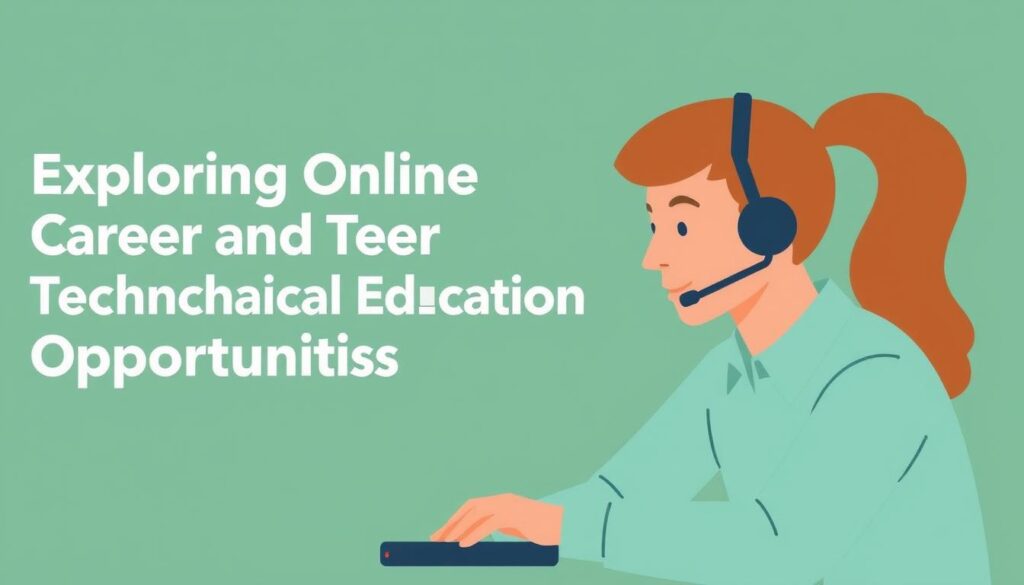The way we learn is changing. With the rise of digital technology, education is becoming more accessible and flexible. Online learning is at the forefront of this change, allowing students to take control of their educational journey.
Online education offers a range of benefits, including the ability to learn at your own pace. This flexibility is particularly valuable for students who need to balance their studies with other responsibilities. Whether you’re looking for a K-12 education or higher education, there are various online school programs available to suit your needs.
As we explore the world of online education, we’ll examine the different types of programs available and provide insights into how to choose the right one for you. By the end of this article, you’ll have a better understanding of how to succeed in online learning.
Table of Contents:
- The Rise of Digital Education in America
- What Are Online School Programs?
- Benefits of Learning at Your Own Pace
- Types of Online School Programs Available
- K-12 Online Public School Options
- Online College and University Degrees
- Career and Technical Education Online
- How Online School Programs Work
- The Role of Teachers in Online Education
- Parent Involvement in Online Learning
- Flexibility and Scheduling in Online Programs
- Socialization Opportunities in Virtual Schools
- Accreditation and Quality of Online School Programs
- Cost Considerations for Online Education
- Technology Requirements for Success
- How to Choose the Right Online Program for Your Needs
- Success Stories: Thriving in Online Education
- Conclusion
The Rise of Digital Education in America
The landscape of American education has transformed with the rise of online schools. Institutions like Connections Academy support schools across 31 states, serving over 100,000 students. This growth reflects a significant shift in learning methods.
What Are Online School Programs?

Online school programs represent a significant shift in education, utilizing digital environments for learning. These programs, such as those offered by Connections Academy for K-12 and University of Phoenix for higher education, provide flexible and accessible learning opportunities.
They differ from traditional in-person education by delivering curriculum through digital platforms and learning management systems, allowing for both synchronous and asynchronous learning models.
The core components include virtual classrooms, communication tools, and a structured curriculum, making online learning a comprehensive alternative to traditional schooling.
Benefits of Learning at Your Own Pace
Self-paced learning environments offer a range of advantages that enhance the educational experience. According to the University of Phoenix, their online classes give students the flexibility to balance family, work, school, and life, allowing them to pursue education when and where they want.
This flexibility is crucial for students with various commitments and responsibilities, enabling them to manage their time effectively. By learning at their own pace, students can reduce stress and improve information retention, leading to greater success in their studies.
- Self-paced learning allows students to dive deeper into subjects that interest them.
- It enables students to move quickly through familiar material, optimizing their learning experience.
- Research-backed benefits of personalized learning paces include improved academic achievement and student satisfaction.
By adopting self-paced learning, students can achieve a more balanced and effective educational experience, ultimately leading to greater success.
Types of Online School Programs Available

The spectrum of online school programs is vast and varied, catering to learners of all ages and needs. These programs range from K-12 options like Connections Academy to higher education through University of Phoenix and career-focused training through Penn Foster.
Online programs can be public or private, with key differences in curriculum, funding, and accessibility. Learners can choose between full-time and part-time programs, depending on their schedule and goals.
Specialized programs are also available, including language immersion, STEM-focused, and arts-centered curricula. Additionally, hybrid models combine online and in-person learning experiences, offering flexibility and hands-on training.
K-12 Online Public School Options
With the rise of digital education, K-12 online public schools have become a viable option for many families.

Online public schools for K-12 students offer a range of programs tailored to different educational needs. These programs are designed to be flexible and accommodating.
Elementary School Programs
Elementary school programs focus on foundational skills and knowledge, providing a solid base for future learning. These programs are designed to be engaging and interactive.
Middle School Programs
Middle school programs build on the foundational skills, introducing new subjects and concepts. They help students develop critical thinking and problem-solving abilities.
High School Programs
High school programs include a variety of course options, such as college prep, honors, and career-focused classes. These programs prepare students for their future career or college endeavors.
Online high school programs often include college prep courses, career exploration, and advanced learning options to prepare students for their future paths.
- Comprehensive overview of online high school diploma programs and their accreditation
- Explanation of graduation requirements and comparison to traditional high schools
- Discussion of college preparation resources available through online high schools
- Information about AP, honors, and dual enrollment options in virtual high schools
- Overview of career exploration and vocational training opportunities in online high school programs
Online College and University Degrees
The flexibility of online college and university degrees is revolutionizing the way we approach higher education.

Online college and university degrees offer students the opportunity to pursue higher education at their own pace, with flexible scheduling and access to a wide range of programs. This flexibility is particularly beneficial for students who are working or have other commitments.
Bachelor’s Degree Programs
Bachelor’s degree programs online provide students with a comprehensive education in their chosen field, preparing them for a successful career. These programs are designed to be flexible, allowing students to balance their studies with other responsibilities.
Master’s Degree Programs
Master’s degree programs online offer advanced education and training, enabling students to specialize in their field and enhance their career prospects. These programs typically involve a combination of coursework and research, providing students with a rich and engaging learning experience.
Doctoral Programs
Doctoral programs online, such as those offered by the University of Phoenix, provide students with the opportunity to pursue advanced research and education in their field. These programs are primarily online, with three required face-to-face residency experiences, and offer specializations in business, education, and health. Online doctoral programs provide support for students throughout their studies, including guidance on dissertation processes and research.
Career and Technical Education Online
Penn Foster’s online programs are designed to help individuals prepare for new careers or advance in their current ones. Online career and technical education offers a comprehensive overview of available options, including certification courses and vocational training.

How Online School Programs Work
Online school programs have revolutionized the way students learn. They utilize various digital tools to facilitate learning.
Learning Management Systems
Learning Management Systems (LMS) are the backbone of online education, providing a centralized platform for course materials and support.
Virtual Classrooms
Teachers use virtual classrooms to deliver live lectures, share resources, and engage with students.
Communication Tools
Online programs use various communication tools, including email, discussion boards, and video conferencing, to connect students with teachers and peers.

The Role of Teachers in Online Education
Effective teachers in online programs are essential for helping students achieve their academic success. According to Connections Academy, certified teachers provide individualized support to students while igniting their passions and helping them gain life skills needed to thrive in the modern world.
Teaching in an online environment differs significantly from traditional school settings. Online educators must be adept at using digital tools to create engaging learning experiences. They undergo specialized training to understand how to facilitate learning in a virtual setting.
- Online teachers provide personalized instruction tailored to each student’s needs and learning style.
- They are available to answer questions and provide feedback through various digital communication tools.
- Innovative teaching methods, such as interactive simulations and virtual labs, enhance the online learning experience.
By leveraging these approaches, teachers can ensure that students receive a high-quality education that prepares them for future success.
Parent Involvement in Online Learning
In online schools, parents are not just spectators; they are active participants in their child’s learning process. At Connections Academy, parents serve as Learning Coaches, supporting their child’s education alongside teachers and staff. This role involves balancing supervision with promoting independence, creating an effective home learning environment, and utilizing resources provided by the school.
Some key responsibilities of Learning Coaches include:
- Supporting their child’s learning needs
- Encouraging independence and self-motivation
- Creating a conducive learning environment at home
By working together with teachers, parents can help their child achieve academic success in a virtual school setting.
Flexibility and Scheduling in Online Programs
The flexibility of online programs allows students to manage their time effectively. According to the University of Phoenix, earning a degree doesn’t have to feel like a second job, as their online classes provide flexibility to balance family, work, school, and life.
Online programs offer various scheduling options to accommodate different needs. Asynchronous learning allows students to complete coursework on their own schedule, while synchronous learning requires real-time participation.
Effective time management is crucial in online learning environments. Students can create a daily or weekly schedule to stay organized and meet deadlines.
Socialization Opportunities in Virtual Schools
Connections Academy and similar online schools offer a variety of ways for students to socialize and have a fun experience. Through live virtual classes, in-person field trips, and extracurricular clubs, students can interact with peers and make new friends.
Online schools provide a platform for a child to connect with others who share similar interests, fostering a sense of community and school spirit.
Accreditation and Quality of Online School Programs

Accreditation is a key indicator of the quality and credibility of online educational institutions. It ensures that online school programs meet specific standards, providing students with a legitimate education. The Higher Learning Commission accredits institutions like the University of Phoenix, while Cognia (formerly AdvancED) accredits schools such as Connections Academy.
To verify accreditation, one can check the accrediting agency’s website or contact the institution directly. Understanding the different types of accreditation and their importance is crucial for making informed decisions about online school programs. Quality standards for online education providers and state approval processes for virtual schools also play significant roles in maintaining quality.
It’s also essential to be aware of diploma mills and unaccredited programs to avoid potential pitfalls in online education.
Cost Considerations for Online Education
Online education costs vary greatly, from tuition-free public school options like Connections Academy to costly private and higher education programs. When planning for a child’s future, consider additional expenses like technology and materials. Financial aid and scholarships can help offset costs, making online school a viable option.
Technology Requirements for Success
Online learning requires specific technology to ensure students’ success. A reliable internet connection and suitable devices are necessary for accessing learning platforms and completing coursework. Resources such as computers or tablets and software are essential. Ensuring the right technology setup is key to success in online learning.

How to Choose the Right Online Program for Your Needs

The key to a successful online education lies in choosing a program that aligns with your goals and learning style. To make an informed decision, consider factors such as accreditation, format, support services, and outcomes.
When researching online schools and programs, ask questions like: What are the program’s strengths and specializations? How does the online school support its students? What are the outcomes for graduates?
By carefully evaluating these factors and matching program features to your individual needs, you can secure a bright future for your child or yourself, learning in a way that suits you best.
Success Stories: Thriving in Online Education
With the rise of digital education, students across America are thriving in online public school environments that foster learning and success. According to a 2024 Parent Satisfaction Survey at Connections Academy, parents agree that their child’s teachers are supportive and the program is inclusive.
- Students have excelled in various online learning environments.
- Different age groups and educational levels have benefited from online programs.
These success stories highlight the effectiveness of quality online school programs.
Conclusion
The rise of online school programs has transformed the educational landscape, offering diverse options for students across the United States.
Online school programs provide flexibility and personalized learning, allowing students to learn at their own pace. The benefits include access to a wide range of courses and programs, from K-12 to college and university degrees, as well as career and technical education.
As online education continues to evolve, it’s essential for students to explore their options and find the programs that best match their needs. With the right online program, students can achieve their educational goals and succeed in their chosen field.

